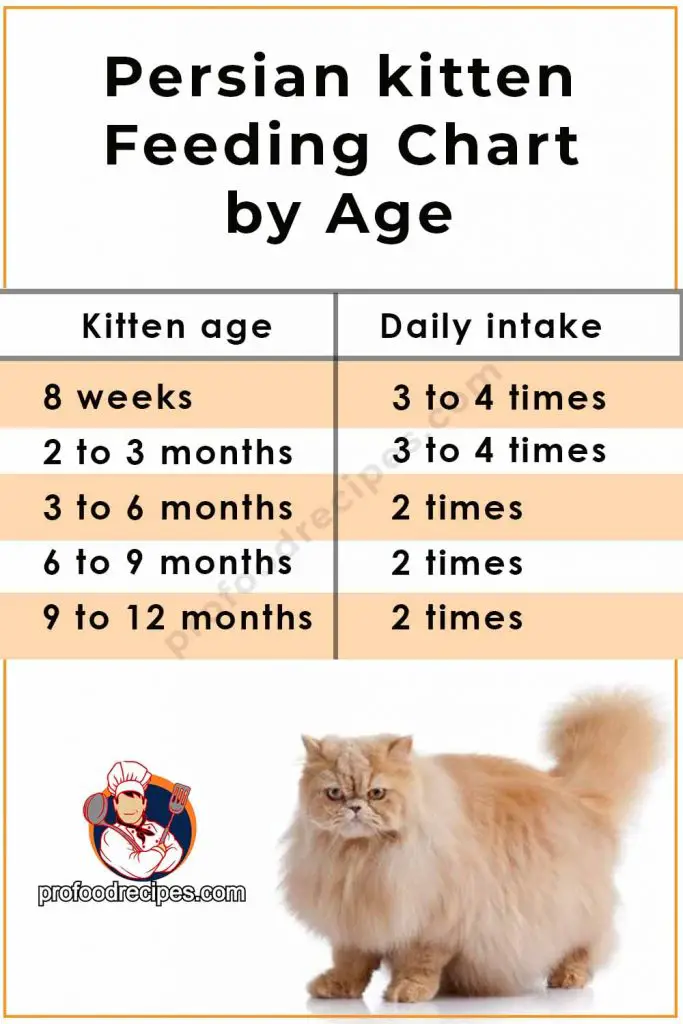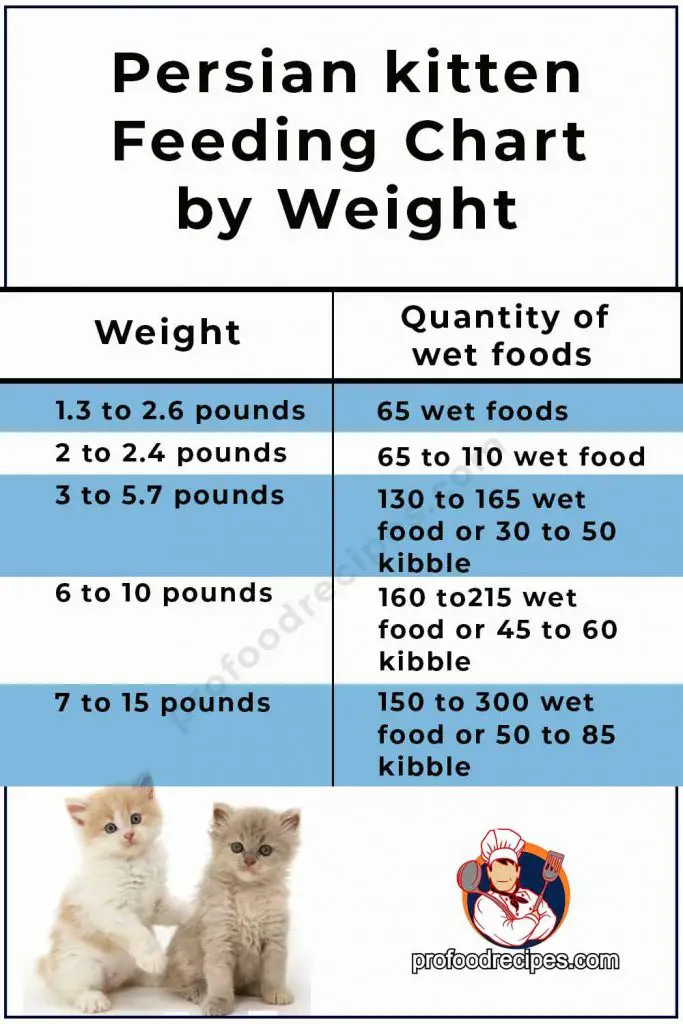Last Updated on December 25, 2023 by Amanda P. Brown
Raising Persian kittens as a pet is difficult due to their delicate dietary preferences. Especially when kittens are weaned off their mothers’ milk, they usually need a much more diversified diet. They require enough vitamins, lipids, minerals, calcium, carbs, and protein. Therefore, it is necessary to be careful about their food and make a well-balanced diet.
Thus, choosing homemade food for Persian kitten is the best approach to take care of their digestive system, urinary health, dental health, mental health, and overall health. So, for Persian cat food for 2 months I will share some homemade foods for Persian kittens. Cat rearers who don’t have a precise idea about the Persian kitten diet will get benefit from this article to a great extent.
Basic Kitten Feeding Guideline
Table of Contents
Rearing a little feline friend comes with a lot of responsibility. Therefore to make your task easy, I will provide you with the proper feeding guideline (from 1 month to over 10 months) for Persian kittens.

Persian Cat Food for 1 Month Old Kitten (4-5 Weeks)
You can give them milk in a bottle. But, to ensure the kitten’s proper growth and weight gain, it is necessary to maintain a food diet that makes the kitten habituated with solid food. At this age, kittens get ready to feed solid foods with milk. However, if your kitten shows more interest in milk than solid foods, you can blend solid food with milk. It’s an ideal way to a fed kitten during this food habit-changing period. It makes the change gradually.
Moreover, at this age, you must introduce water to them. It would be best to feed a shallow bowl of fresh water to your kitten daily when they age 4 weeks. Afterward, for proper physical growth and weight gain, you should feed your kitten after every 4 to 6 hours.
Persian Cat Food for 2 Months Old Kitten (6-8 Weeks)
At 6 to 8 weeks, it is high time to wean off them from milk bottles and switch them to solid food. Therefore, you can treat them with a dry and raw foods mixture. Only water and dry meals should be their staple food at this age. Meanwhile, try making kitten food with some water and meat-flavored human baby food. However, you should feed a kitten 3 to 4 times a day at 6 to 8 weeks.
Persian Cat Food for 3 Months and Above 10 Months (8 Weeks to 10 Months)
3 months Persian cat weight around 0.8 kg – 2.1 kg. At this age, you should feed protein base food such as boiled chicken. However, the first 6 months are a rapid period of growth in a cat’s life. So it is evident that your cat needs extra nutrients and calories at this time. So, it would be best to increase their solid food intake during this time gradually. Also, keep them hydrated enough with a dish of fresh water every day. However, during this period, feed solid foods to your kitten 4 times a day.
Food for 10 Months Old Persian Kitten
After 10 months, it’s time to start introducing your kitten to adult foods. So, you can begin feeding them raw and healthy meals according to the veterinarian’s recommendation. You should maintain a well-balanced diet for your kitten every day.

Moreover, some cats get affected with diabetes at this age, so it is also essential to make sure they drink plenty of water every day. Also, please keep track of whether your kitten is capable of chewing its preferred kibble or not. However, it would be best to feed a 10-months old kitten 3 times a day.
How Many Times to Feed a Persian Kitten?
| Kitten Age | Daily Intake | Weight | Quantity of Wet Foods |
| 8 Weeks | 3 to 4 Times | 1.3 to 2.6 Pounds | 65 Wet Food |
| 2 to 3 Months | 3 to 4 Times | 2 to 2.4 Pounds | 65 to 11o Wet Food |
| 3 to 6 Months | 2 Times | 3 to 5.7 Pounds | 130 to 165 Wet Food or 30 to 50 Kibble |
| 6 to 9 Months | 2 Times | 6 to 10 Pounds | 160 to 215 Wet Food or 45 to 60 Kibble |
| 9 to 12 Months | 2 Times | 7 to 15 Pounds | 150 to 300 Wet Food or 50 to 85 Kibble |
7 Homemade Food for Persian Kitten
Here is the list of homemade food for Persian kitten, which is naturally healthy and easy to feed.
1. Chicken
As cats are carnivores by nature, boiled or cooked chicken is the best treat for your Persian kitten. Besides, chicken is also considered the healthiest meat for kittens because of its low-fat content. Remove the skin off the chicken by simply rinsing it with water. Then, place the chicken in a medium saucepan with adequate water. Cook it for 20 minutes with the lid on. Allow the chicken to cool completely, and feed it to your kitten.
Most importantly, feed your kitten hormones and antibiotics-free chicken. These two components may not harm humans, but they can make your little furry friend sick. In addition, as kittens can have complex dietary, the boiled chicken should be given to your kitten as a treat once or twice a week.
2. Salmon
It is impossible to keep cats separate from fish. So the best way to treat cats with fish is by giving them cooked Salmon. Cooking salmon at a high temperature reduces its nutritional value. So, to serve your kittens, it is better to cook Salmon over low heat and at a consistent temperature.
On the other hand, instead of frying the Salmon, you can choose boil, poach, or roast salmon to feed your feline friend. You can also add seasonings such as salt, vinegar, and pepper with Salmon to cook it. Just cook Salmon for 15 minutes, covering parchment paper before feeding them. Most importantly, it would be best to feed Salmon to your kitten once a week.
3. Turkey
Turkey is an ideal choice for making homemade food for Persian cats and kittens. Your kitty can have cooked and boneless turkey on their meal to maintain a balanced weight, strong heart, and a healthy reproductive system.
Cooking turkey without adding seasoning is the safest way to prepare it for your Persian kitten. Just cut it into small bite pieces and feed it to your feline friend as a treat. But always get remembered, providing too much fat can create stomach upset in your kitty. So always avoid feeding them turkey skin and dark meat.
4. Rice
Many ailurophiles think that rice is not essential to add to our kitten diets. But a small amount of rice will prove helpful if your kitty has digestive issues. Plain, white, and brown rice can be fed in small quantities when they have an upset stomach. Many vets suggest adding some rice with cat food to prevent diarrhea.
Cook the rice without adding any seasoning and spices for your Persian kitten. Again, you can feed uncooked rice to your kitten if they have high digestive issues and vomiting problems.
5. Ground Beef
All cats are carnivores, so they require some essential nutrients from meat. If you are making homemade food for Persian kitten, then cooked ground beef is one of the best treats for kittens. Beef is a very high-protein diet essential for kitten health development. According to a veterinarian, unseasoned cooked ground beef causes no harm to a kitten’s body.
Place the ground beef in a small pan and simmer it for 30-40 minutes before serving. However, cooking time can vary from quantity to quantity of meat used. Always remember, only lean, drained of fat, unseasoned, and fully cooked ground beef is safe for a kitten’s body.
6. Egg
Cooked eggs are suitable for your Persian kitten. You can serve fried, boiled, and scrambled eggs to your Persian kitten without adding seasoning and spices. To introduce eggs to your kitten, mix 1 or 2 cooked eggs into your cat’s regular food and feed it to them. Scramble or boil the egg whites at 160 degrees internal temperature to feed your kitten.
Get remembered that feeding raw eggs white to your Persian kitten can produce deadly salmonella bacteria, which can cause diarrhea and vomiting badly. In addition, they are allowed to eat boiled eggs only once a week.
7. Apples
Being carnivores, cats naturally don’t want to taste sweetness. But if you’re going to offer an apple to your little friend, all you have to do is wash it, cut it into cat bite-size and remove the seeds from the apple before feeding them. Apple contains a good amount of antioxidants, vitamin K, calcium, and fiber. All of these contents are beneficial for a kitten’s health. Remember not to include apples in their usual diet; instead, give them apple slices as a treat.
Is Milk Good for Persian Cats?
It is a pretty common question to all of us. But the truth is that giving milk to Persian cats is not a good idea due to the lactose content. Just like other cats, Persian cats also enjoy drinking milk.
However, giving milk, particularly cow milk, to your cat daily causes significant health issues like; diarrhea, vomiting, and bloating. You can treat your Persian cat with alternatives to milk that have less lactose, such as yogurt or lactose-free milk.
FAQs
Can Persian Cats Eat Chocolate?
No, it is best not to give chocolate to your Persian cats. They are also prohibited from feeding any milk-based chocolate drink. Chocolate contains theobromine, a chemical component that increases a cat’s heart rate. Chocolates can cause more poisoning symptoms in Persian cats, such as seizures, increased urination, vomiting, tremors, and diarrhea.
Can Persian Cats Eat Human Food?
Not everything people consume is safe for your Persian cat, even though they love eating what we eat. Yet there are some foods you can add to their plate:
· Meat.
· Rice.
· Fish
· Bananas
· Cheese
· Melon
· Carrots.
· Berries
Can Persian Cats Eat Potato?
Not regularly, but occasionally they can eat potatoes. Potatoes include carbs, which cats don’t need. Peeled and baked potatoes without fats, spices, or salt are occasionally suitable for your Persian cat. Remember, Too many potatoes in a Persian cat’s diet can result in weight gain, digestive problems, and diabetes.
What Can Persian Cats Not Eat?
Though cats are adaptable eaters, there are some foods you shouldn’t feed them. Not-safe-for-Persian-cat-consumption items include the following.
· Onions and Garlic
· Dog Food
· Caffeine
· Chocolate
· Alcohol
· Raw Meat and Fish
· Bones
· Artificial Sweeteners
· Grapes and Raisins
· Dairy Products
Is Roti Good for Persian Cats?
You shouldn’t feed your pet rotis. The potential harm that gluten poses to your pet far outweighs any benefits from the protein it may provide. In addition, the shorter length of a pet’s intestines makes it more difficult to process plant-based diets.
Can Persian Cats Drink Milk?
NO. Persian cats, like all other cats, are lactose-intolerant once they outgrow their kitten stages. Consuming milk or milk derivatives can cause stomach upset, resulting in an unpleasant odor in the litter box and bloating and gas.
Can My Persian Cat Eat Rice?
Yes. Your Persian cat can eat rice without worry. While your Persian may enjoy rice, it is important to only feed it in limited amounts. Your Persian cat may not do well on a diet with a lot of rice. If you want to offer your cat a healthy dose of carbohydrates and energy, a tiny amount of cooked rice is an excellent option.
Final Verdict
As kittens have a particular need for food for their growth and development, you have to select the best homemade foods to fulfill their proper nutrition. By serving homemade food to your kitten, you can check their calories intake nutritional needs and keep them healthy and sound.
However, selecting the perfect homemade food for Persian kitten might sometimes seem challenging for special dietary needs. So, if your Persian kitten frequently meows for a taste, you can feed them the above-mentioned homemade foods to satisfy their hunger. You can also read another article about Persian cats’ homemade food.
You May also Like to Read:
- Wet Cat Food – 26 Question and Answer
- Dry VS Wet Cat Food Pros and Cons
- 7-Easy Weight Gain Dog Food Recipes

